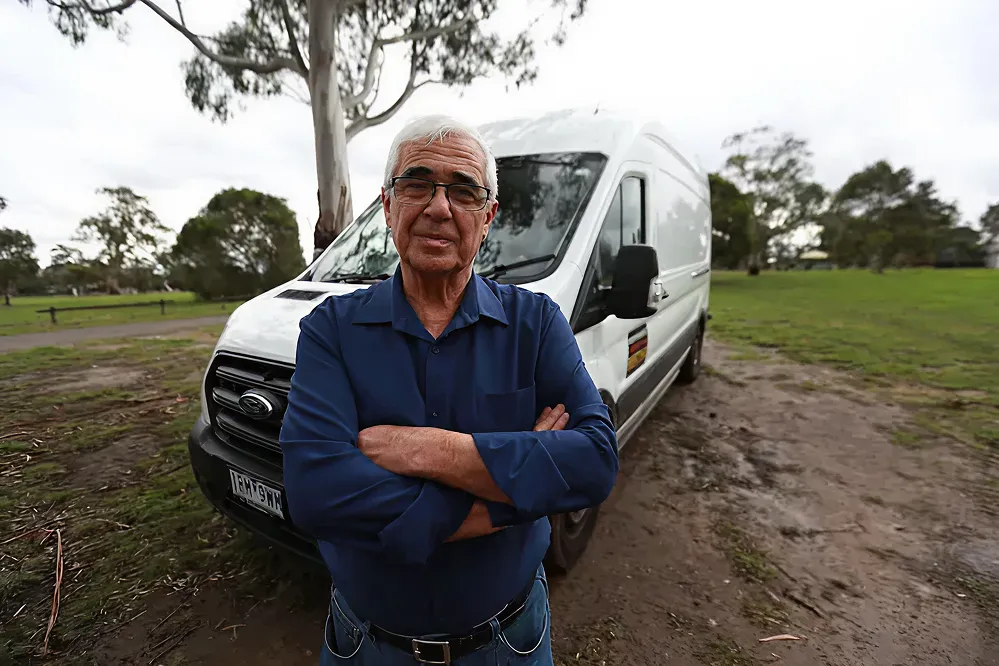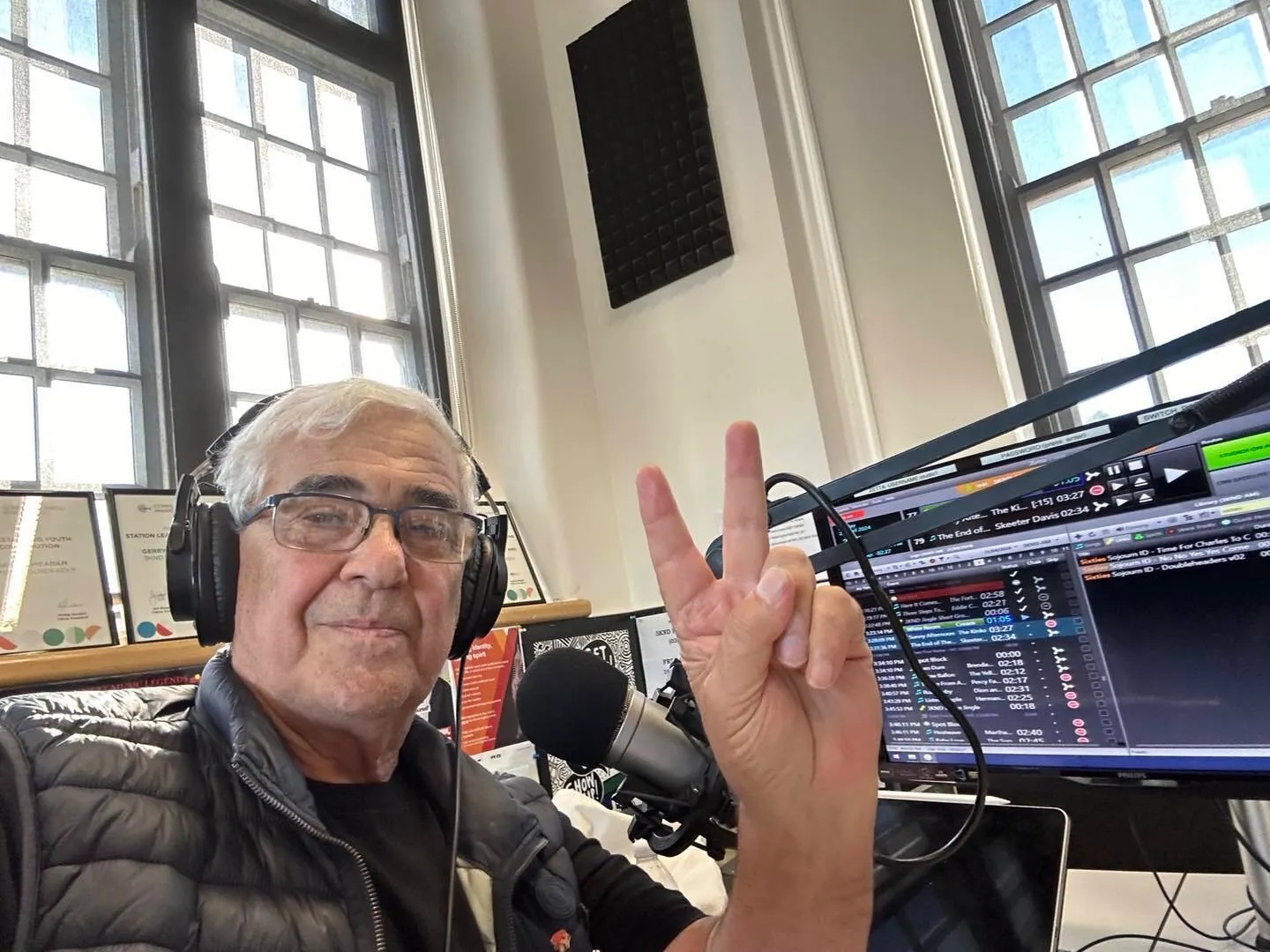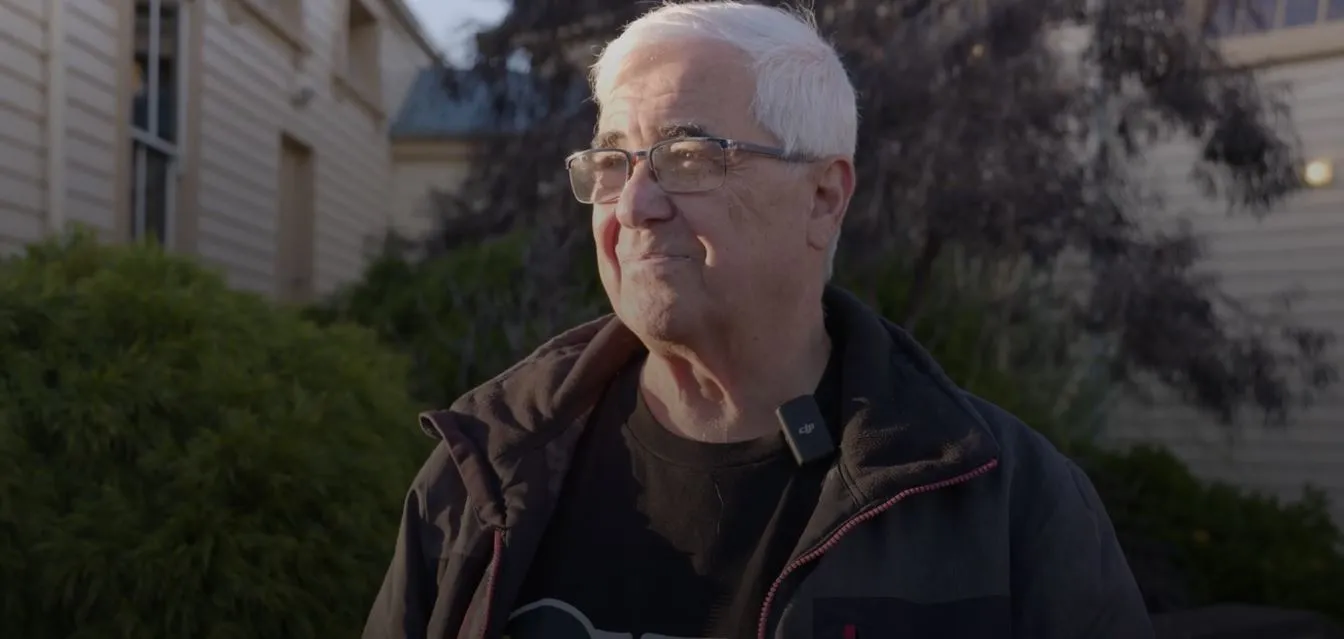From his van on Country to the airwaves across Victoria, Uncle Charles Pakana is amplifying First Nations voices through Victorian Aboriginal News. We spoke to Uncle Charles about how the independent media project, backed by Bank Australia, is changing the narrative around reconciliation and truth-telling.
For Uncle Charles Pakana, journalism is more than just a profession – it’s a way to connect with community. To honour ancestors. To tell the truth. “The stories I focus on are those of strength, resistance, resilience and reconciliation,” says the founder of Victorian Aboriginal News (VAN). “Underpinning everything, of course, is self-determination.” Supported by Bank Australia’s impact fund in line with our First Nations Recognition and Respect Strategy, VAN is carving out a vital space in the media landscape to amplify Blak voices and perspectives, as well as those of allies and collaborators. “They’re very important to what we’re seeking to achieve,” says Uncle Charles. “So we’re providing them with a voice as well.”
VAN life: How it all began
VAN’s story began around eight years ago as Connection Matters Radio, a self-funded project by Uncle Charles. “Then, around five years ago, I gave away all of my possessions and moved into a van full-time to travel around Victoria and work with Traditional Owners and Aboriginal communities to record their stories and share them for free,” Uncle Charles says. “That was really the beginning of Victorian Aboriginal News. Of course, the acronym is VAN, so that was purely by accident – one of those beautiful, serendipitous things.”
Today, VAN’s content is broadcast through its own channels, but also on Melbourne’s 3KND and Triple R, and Phoenix FM in Bendigo. It’s still a one-person project, but now receives crucial funding support from partners, including Bank Australia.
“We’re honoured to be supporting Uncle Charles and Victorian Aboriginal News, specifically his VAN Talks podcast,” says Rafe Pfitzner Milika, Bank Australia’s Reconciliation Strategy Manager. “His coverage of Treaty, reconciliation, Aboriginal affairs and truth-telling provides very useful, insightful information. We’ve been very fortunate to make this connection with Uncle Charles, who is a leader in this space.”

A born storyteller with a focus on truth
Of Tasmanian Aboriginal descent, Uncle Charles identifies as disconnected – lacking documented connection to a specific Country – due to the impacts of colonisation and genocide. (You can read more about Uncle Charles’s story of disconnection in his submission to the Yoorrook Justice Commission.)
Uncle Charles’s path to media began with a diverse and unconventional career. After leaving school at 16 and joining the army on his 17th birthday, he spent nine years in the infantry before transitioning into IT journalism, where he worked for major tech publications and companies. “That gave me a love for freelance and independent journalism,” he says.
He moved to Naarm (Melbourne), which led to deeper involvement in the Aboriginal community, first as an Aboriginal Liaison Officer at Banyule City Council, then into community radio at 3KND. “I met Uncle Jim Remedio, 3KND’s station manager, who said, ‘You’ve got a great voice for radio.’ I told him, ‘Only if it’s not music. I want to do current affairs and news.’ And that was the start of that.”
He has also been involved with Victoria’s ongoing Treaty process, becoming the country’s first Treaty correspondent in 2018 and subsequently working on the communications team of the First Peoples’ Assembly of Victoria in order to gain an “insider’s” perspective. He currently supplements and self-funds VAN through his consultancy work, public speaking and MCing.
For Uncle Charles, Victoria is not just where he lives – it’s home. “I very strongly identify as a Victorian Aboriginal man,” he says. “I’m fiercely proud of that and, of course, deadly passionate about Victoria and the mobs here and facilitating their stories to be told – no one else is doing it.”

Stories that preserve, educate and heal
The VAN Talks podcast series, which sees Uncle Charles travel the state in his van covering Aboriginal Affairs, now has over 120 episodes covering a diverse range of topics.
It’s hard to pick favourites, but Uncle Charles does have a few personal standouts, including an interview with Uncle Dave Wandin, who shared the unspoken history of Coranderrk Mission, where multiple Nations were forcibly relocated. Another was with Roland Atkinson, who spoke about developing the first Bangerang language dictionary. “This life coming back into language just blew my mind,” says Uncle Charles.
Another highlight was the Referendum 23 Tapes, which included 40 episodes educating listeners ahead of the Voice Referendum and featured people who were strong in their beliefs (pro or against) like Thomas Mayo and Nationals member David Littleproud. “That was just an amazing experience of doing something for an important cause,” says Uncle Charles.
After being deeply impacted by the deaths of giants such as Uncle Jack Charles and Uncle Archie Roach, he launched the Leader Tapes to document the lessons and experiences of senior Aboriginal leaders in Victoria. “We’d lost so many,” says Uncle Charles. “That’s what drove me to start this project – passing on the stories. The messages and stories they have – they need to be preserved.”

A voice for the future
Uncle Charles is currently working to establish VAN as an independent, sustainable media entity – one that can continue beyond his own lifetime. “With the help of partners, I want to make sure Victorian Aboriginal News becomes something that lasts beyond my death or retirement,” he says. “Because I believe Victorian Aboriginal stories need to be told, just as truth-telling needs to continue. There’s never going to be an end for that.”
Between funding and balancing life on the road with his other work, there are plenty of challenges to running VAN, which is why support from partners like Bank Australia makes a crucial difference. “That was phenomenal,” he says. “That was a licence to work.”
Despite any challenges, continuing the long and profound history of First Nations storytelling makes it all worth it for Uncle Charles. “I love to be a conduit,” he says. “Being out on Country, sitting down, yarning with Mob and helping them share their stories …to me, it’s just the most fulfilling and beautiful thing that I could ever do in my life.”








